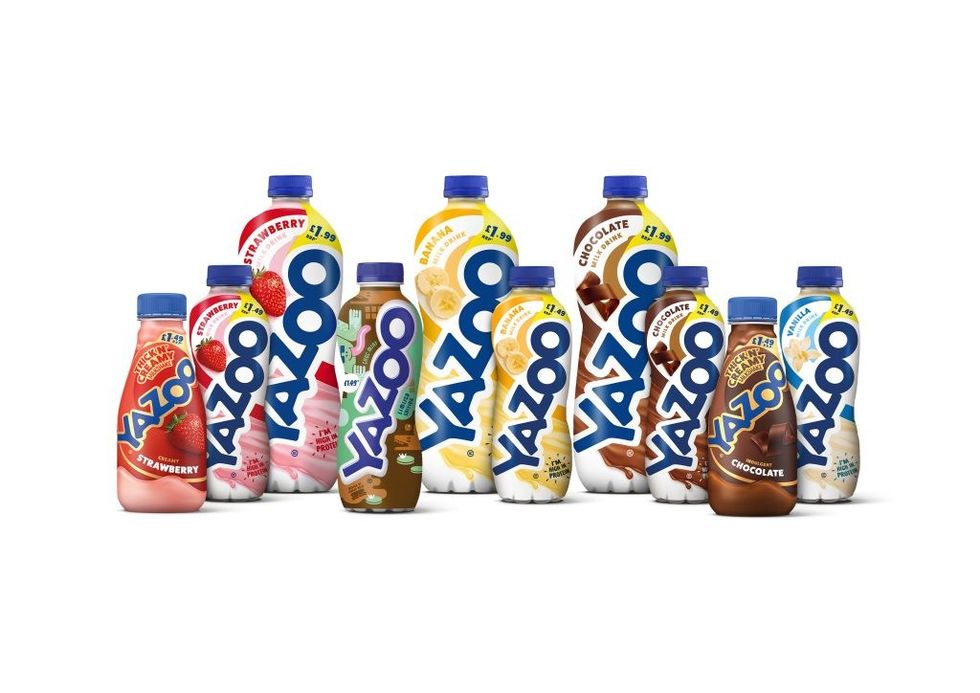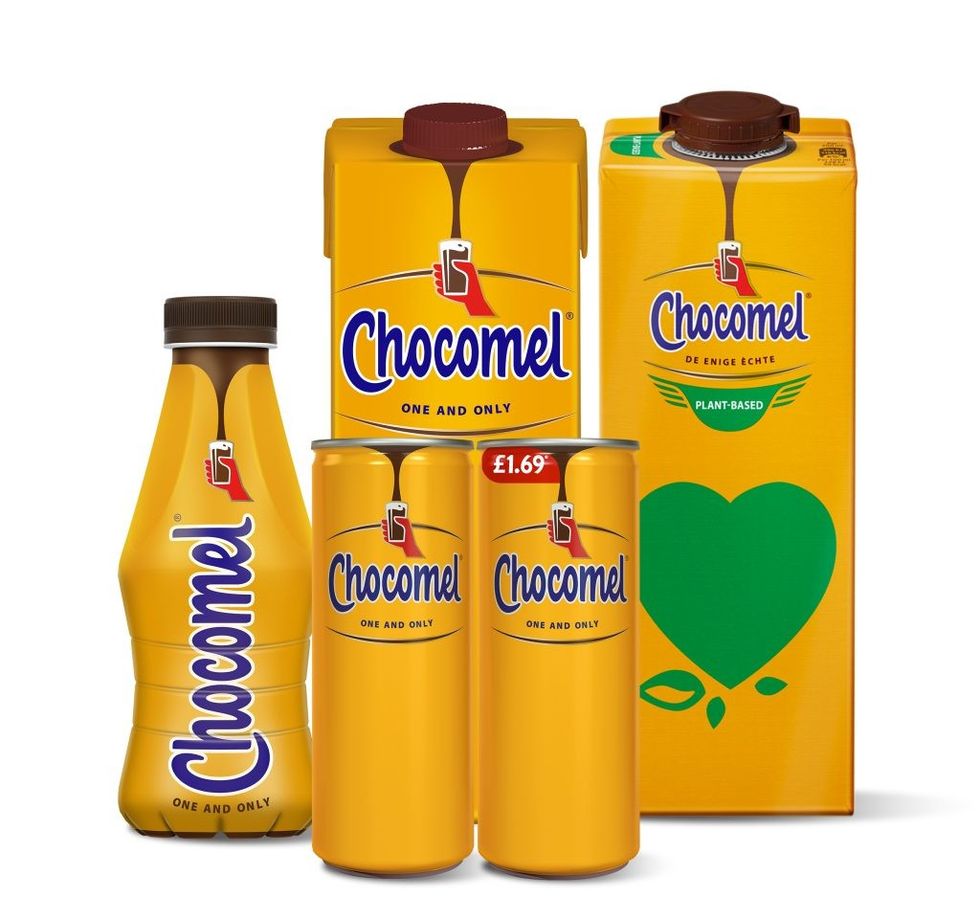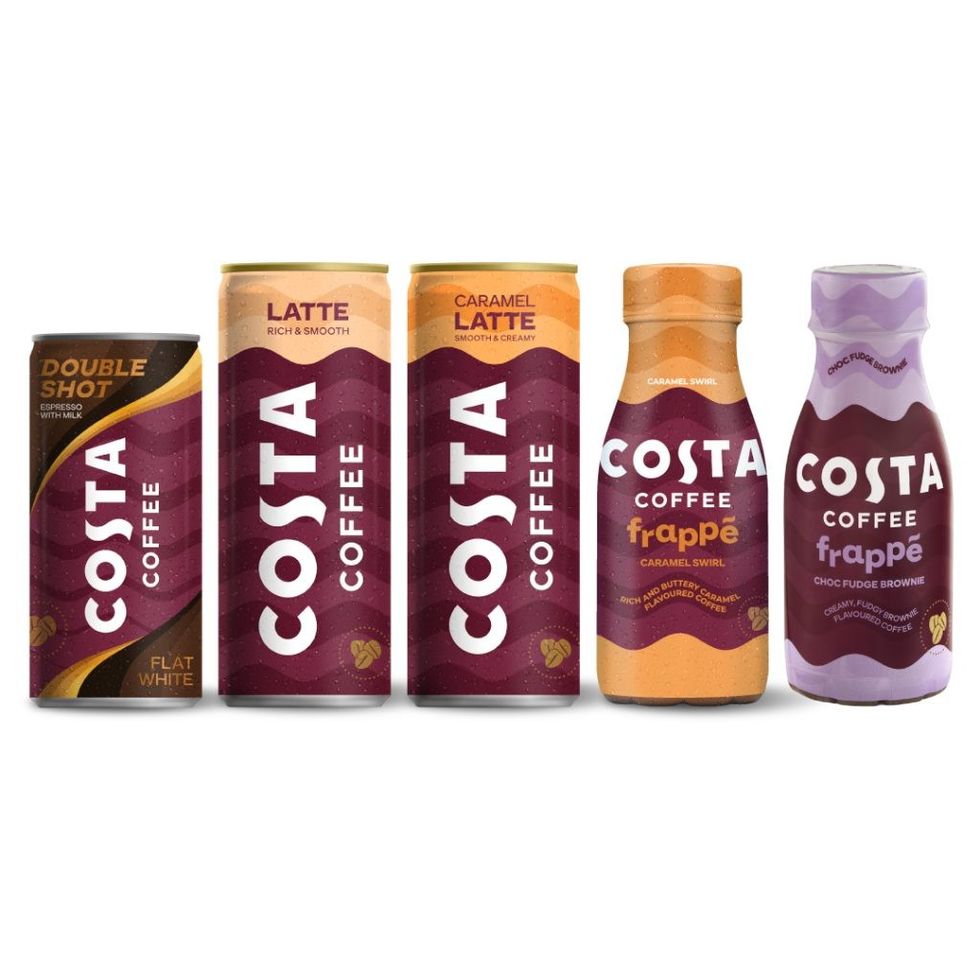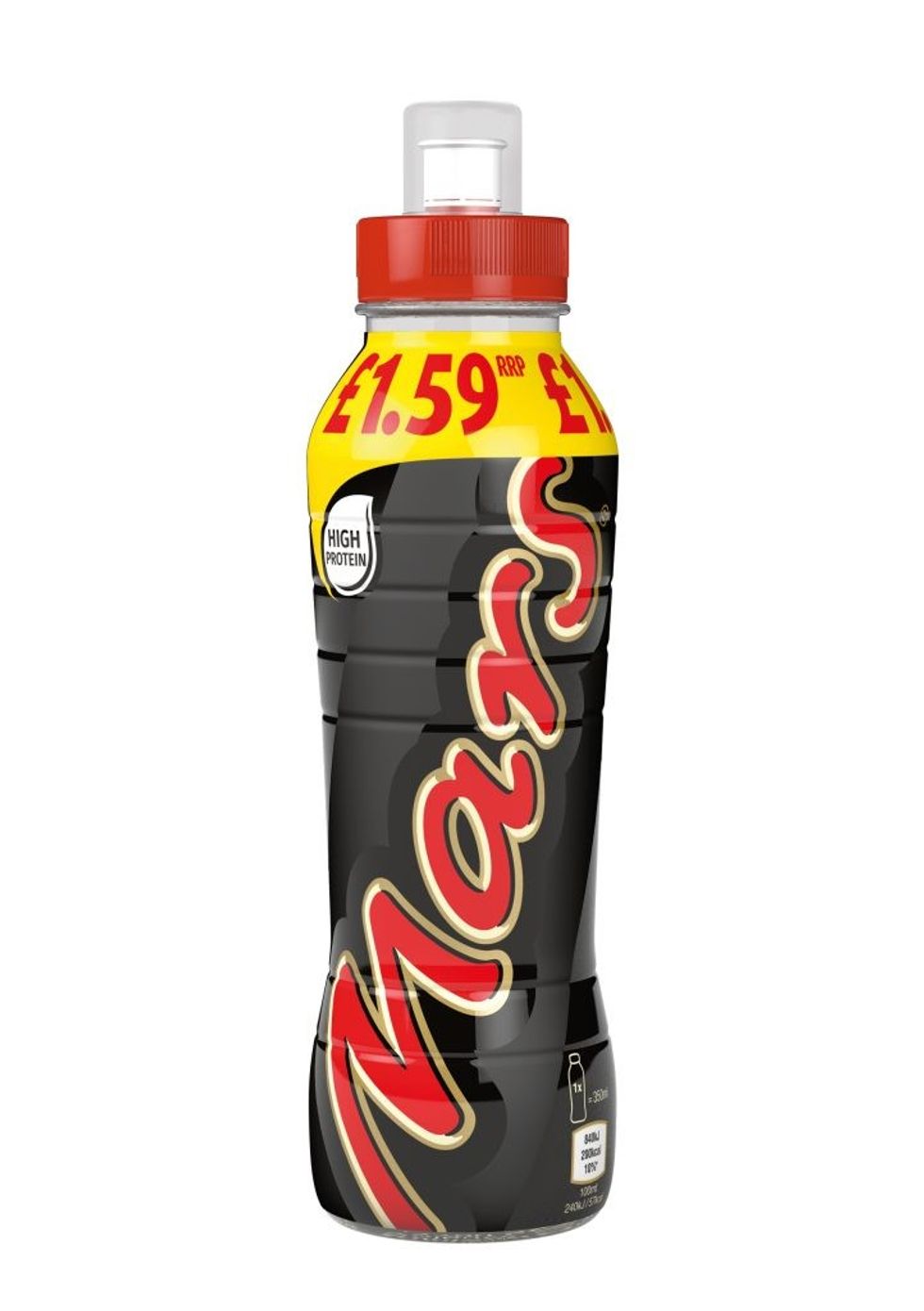Chilled milk drinks – often caffeinated – are growing more and more popular, and have health as well as taste to recommend them
In the bustling world of convenience stores, where quick grabs and on-the-go snacks dominate, dairy drinks often play second fiddle to carbonated beverages and energy drinks. However, with the right promotion and strategy, these creamy delights can carve out a prominent place in the refrigerated aisles, enticing customers with their refreshing flavours and nutritional benefits.
Total volume sales of fresh dairy continued to grow in the UK as an increasing number of consumers embraced a healthier diet. And new lines such as cold brew coffee and innovative RTD dairy products, together with food-to-go servings of milkshakes alongside great flavour innovation in long-life/chilled bottled milkshake drinks, have invigorated the category.
Milk flavours
According to the IRI data, the total flavoured milk category in the UK is worth £642 million, and across convenience, sales have grown by 13 per cent over the past year. Convenience sales now contribute 44 per cent of total category sales with a value of £285 million.
Coffee and chocolate flavoured milk are the leading subcategories. Coffee flavoured milk is the largest subcategory, worth £237 million and growing by 14 per cent year on year. Chocolate flavoured milk, the second largest sub-category, is also performing well with value sales worth £122 million.
“Milk drinks have shown themselves to be a resilient and consumer-favourite product, and the return of more out of home occasions, whether that’s grabbing a snack at work or whilst out for leisure, has contributed to their growth in the past few months,” comments Katie Chadd, business unit controller at FrieslandCampina, which owns Yazoo and Chocomel.
Yazoo remains the UK’s leading traditional flavoured milk brand, with one in every nine households purchasing a bottle [Kantar] and continues to perform strongly and outgrow the traditional flavoured milk market in volume sales [IRI].
Premium flavoured milk is the fastest growing sub-category in terms of volume, growing 16 per cent year on year, and now worth £44m. Chadd says they have the fastest growing brand in Chocomel, with 37 per cent year on year.
“Volume growth is ahead of value growth even with CPIs this year, demonstrating the true growth of Chocomel. Penetration has grown 2.6 percentage points, which is a growth of 376 per cent year on year the highest penetration growth in the Flavoured Milk category, and Chocomel is now worth £10.3m,” she adds.
Michelle Frost, general manager at Mars Chocolate Drinks and Treats, says their range offers a winning combination, iconic brands in eye-catching packaging, for independent retailers.
“The PMP and well-known brands draw attention to the product within what can be a crowded chiller,” she points out.
The Mars Chocolate Drinks and Treats range includes Mars, Mars Caramel, Maltesers, MilkyWay, Twix, Snickers, M&M’s Brownie and Galaxy. The range can be stored ambient but is best served chilled. All skus are suitable for vegetarians and have no added sugar.
Value proposition
Chadd also highlights the continuing relevance of price-marked packs (PMPs) in the face of the ongoing cost-of-living crisis and economic uncertainty.
“Consumers are savvier than ever before whilst also refusing to compromise on taste,” she notes. “In line with this sentiment, FrieslandCampina’s PMP formats offer value, taste and convenience by the bottle, and continue to perform extremely well at this time.”
Chocomel introduced an inaugural PMP value offer for its 250ml Chocomel cans (£1.69) last year, designed to help retailers boost their on-the-go beverage sales, drive impulse purchases, and bring incremental shoppers into the category, whilst ensuring a positive price perception among shoppers.
Additionally, Yazoo offers permanent PMP variants of all core flavours as well as across its limited-edition flavours, meaning the range can be tailored to whatever best suits the store.
“Retailers can stock the flavours and sizes they know sell well in their locale, whilst communicating great value to shoppers and maintaining that point of difference - especially as the weather heats up and consumers are looking for a milk drink fix to quench their thirst whilst getting the benefits of dairy goodness,” Chadd adds.
Yazoo’s larger format 1 litre bottles are available as a £1.99 PMP, whilst the core 400ml bottle is available in a £1.49 PMP. The 400ml PMP is a great option for the impulse and drink now occasion, whilst the 1 litre bottles are perfect for take-home and sharing moments, meaning there really is something for everyone.
As innovation is also crucial to driving footfall, Yazoo has introduced last year a brand-new, HFSS-compliant, indulgent milkshake format: Thick N’ Creamy. The launch represented the first permanent NPD from the brand since 2016, proof of the serious investment in and backing of the proposition from FrieslandCampina.
Thick N’ Creamy, in £1.49 PMP format, is available in grocery and convenience channels in two delectable flavours - Indulgent Chocolate and Creamy Strawberry – with on-pack visuals communicating the thick texture and creamy taste sensation of the product within.
“Thick N’ Creamy offers an indulgent taste at an accessible price point that makes it an affordable treat, which we know consumers are turning to more and more in the current climate, using the ‘little and often’ rationale when larger-scale indulgences feel out of reach,” Chadd says.
Nourishing options
FrieslandCampina’s Yazoo KiDS product boasts a completely unique no added sugar or artificial sweeteners recipe, features Universal’s Minions and worth £3.4m.
“Perfect for little ones, a different Minion character features on-pack, which in turn creates a ‘collectability’ repeat purchase driver and the Elopack packaging means it’s easy to recycle the cartons on-the-go,” Chadd adds.
The brand is in a strong position when it comes to HFSS – all Yazoo milk drinks are HFSS-compliant, and Chadd says this helps them to continue to invest in the category – with both above the line advertisements and in-store promotions, as well as feature and display.
Yazoo is free from artificial sweeteners, flavours, or colours, high in protein and is a source of calcium and Vitamin B2, meaning it offers nutritional benefits that most of its competitors in the soft drinks category cannot.
“With its calcium, protein, and vitamin B12 health credentials, and containing the same natural sugar levels as a semi-skimmed glass of milk, it is an essential product in any healthier eating and drinking offering and ideal for an after-school pick-me-up,” she further states.
The brand is also part of the ‘Better Health Food Scanner App’ campaign, with all flavours, including the recently approved chocolate variety, holding the ‘Good Choice’ badge - making it easier for parents to make healthier choices for their children. All the cocoa used in Yazoo KiDS Chocolate is also Rainforest Alliance approved.
Chill out with RTD coffee
Ready-to-drink (RTD) chilled coffee continues to be a star performer in the dairy drinks category, and Amy Burgess, senior trade communications manager at Coca-Cola Europacific Partners (CCEP), attributes the category’s rising popularity to its versatility in catering to various consumer need-states, which is now more relevant than ever for on-the-go consumption.
Adam Hacking, head of beverages at Arla Foods, agrees.
“Dairy drinks are a key player in grocery stores, especially RTD chilled coffee, with the category continuing to see consumption and household penetration growth throughout the last year. More people are buying into the category, to a greater extent, and on a more frequent basis than ever before,” Hacking observes.
“Part of the category’s popularity can be attributed to the fact it meets more than one consumer need – taste, hydration, an energy boost and satiety. It therefore naturally attracts a wider number of shoppers to the category as consumption is driven by different need states, at different times of day.”
Burgess also noted that many coffee drinkers are turning to RTD options from their favorite coffee shop brands, when once upon time they might have nipped out to a café for a similar equivalent, adding that Costa Coffee RTD, now worth £24.4m, up 31.7 per cent [Nielsen MAT w/e 09.09.23], has been a major growth driver in the category.
“This success can be put down to the widespread popularity of the Costa Coffee brand, the nation’s favourite coffee shop for the last 13 years. It is also one of the only full ranges in the segment to be 100 per cent HFSS-compliant,” she says.
RTD chilled coffee is incredibly diverse. Featuring Lattes, Flat Whites and Frappés, Costa’s range caters to a broad variety of different tastes and occasions, offering shoppers a choice of low, medium and high intensity caffeine options as well as different coffee flavours and levels of sweetness.
In January, CCEP launched two PMPs in its Costa Coffee RTD Latte range, to help convenience retailers drive incremental sales within segment.
The 250ml PMP RTD cans of its best-selling Costa Coffee Latte and Caramel Latte variants are expected to support the strong growth of the brand and the overall RTD chilled coffee segment.
In fact, Costa Coffee is the fastest growing major brand within RTD chilled coffee in independent convenience, up 46 per cent in value vs 12.5 per cent for the total segment, and contributing more incremental value sales than any other major brand within independent convenience [Nielsen, MAT 07.10.23].
The launch is being supported by a new Costa Coffee RTD brand campaign entitled ‘Lift up your Break’ which encourages consumers to add an RTD Costa Coffee to a morning or lunchtime break. The campaign will run for three months and includes social media, PR, outdoor advertising and will tap into Costa Coffee’s customer loyalty club members.
Convenience retailers can request POS materials via My.CCEP.com to help generate excitement around the new PMP formats in-store.
Hacking adds that the entry of challenger brands into the RTD chilled coffee category reflects the continuing expansion and interest in RTD Coffee, and in turn the vast profit opportunity for retailers.
“Starbucks RTD is the leading player within the RTD coffee category, worth £145m within a total category worth £297m [Kantar/Neilsen, 52w/e 31.12.23]. The entry of challenger brands is set to drive consideration from new shoppers, which will consequently further grow the category’s worth,” he says.
Arla manufactures, distributes and markets Starbucks premium milk-based RTD coffee beverages for the Europe, Middle East and Africa region under license.
Starbucks RTD has continued to grow with an 18 per cent value and 25 per cent volume increase in the last 12 months, driven by new product launches catering to evolving consumer need states.
A key success has been Starbucks Multiserve, a 750ml sharing size in four flavour variants Caffe Latte, Caramel Macchiato, Skinny Latte and Cappuccino allowing coffee lovers to enjoy their favourite chilled coffee at home.
Hacking notes that their products work best in the convenience stores.
“Typically, Starbucks chilled coffee commands a higher selling price than most soft drinks lines, meaning that many convenience retailers report particularly strong levels of cash rate of sale. This can of course be enhanced through ensuring prominent shelf placement, with POS placement to capitalise on Starbucks’ huge brand recognition,” he says.
Starbucks chilled coffee uses the same beans as in its coffee houses, providing shoppers with the familiarity that they look for. In fact, several trending flavours in RTD coffee reflect products available to purchase in Starbucks coffee houses.
“This shows that, despite value propositions entering the chilled coffee sub-category, shoppers continue to look for familiarity and trusted products they know and love,” Hacking says.
Starbucks Chilled Classic range is a true favourite ensuring shoppers can pick up coffee house classics including the likes of Caffe Latte, Caramel Macchiato and Skinny Latte flavours. The range equates to £82m value sales growing at 29 per cent in the last 52 weeks.
Indulgent and sweeter flavours continue to grow as Starbucks Frappuccino value sales equate to over £43m with Chocolate Mocha and Caramel being the fastest growing flavours.
Chocolate chunk
In 2024 Cadbury is celebrating its 200th year, and as part of the year-long celebrations, Cadbury Hot Chocolate has launched an exciting promotion, offering shoppers the chance to win either £2,000 in cash or one of 200 limited edition Cadbury ‘Chunk’ Mugs.
The iconic Cadbury Chocolate Chunk mugs, with their broad base and big handle, are a hugely nostalgic image that helps highlight the history and heritage of the Cadbury Hot Chocolate brand to shoppers. By giving consumers a chance to own their own “chunk of history”, Cadbury is helping to tap into the nostalgia of the Cadbury brand while creating excitement during the brand’s 200th year on shelf.
To be in with a chance of winning one of the mugs, or one of five top cash prizes of £2,000, shoppers need to enter the code from participating packs on the promotional website at chunk.cadbury.co.uk, or scan the QR code on promotional communications.
Promotional packs are available till mid-April, and the promotion will be supported with out-of-home advertising, influencer communications, email comms and social media activity.
Kefir pleasure
Protein and Kefir are the two fastest growing sub-categories in convenience yogurts, driving 33 per cent of total yogurts growth (IRI, 26.11.23). Biotiful Gut Health’s smooth and creamy Original and fruity Cherry Kefir Drinks are among the top four premium skus.
“Sales of Kefir within convenience have doubled in the last three years, experiencing a 40 per cent surge in value and a 21 per cent boost in volume. We listen carefully to what our consumers want to see, and this is reflected in the types of products we offer,” Melanie Tucker, head of out of home at Biotiful Gut Health, says.
“With regular innovation and a flow of new skus and flavours, Biotiful Gut Health proudly stands as the UK's number 1 Kefir brand, shaping the future of gut health with every sip.”
Kefir comes from the Turkish word “keyif,” which means pleasure, and has long been consumed in the central Eurasian region for its nutritional and health benefits. The fermented milk product, made by pouring milk over kefir grains, which are a cluster of bacteria and yeast, is a probiotic powerhouse.
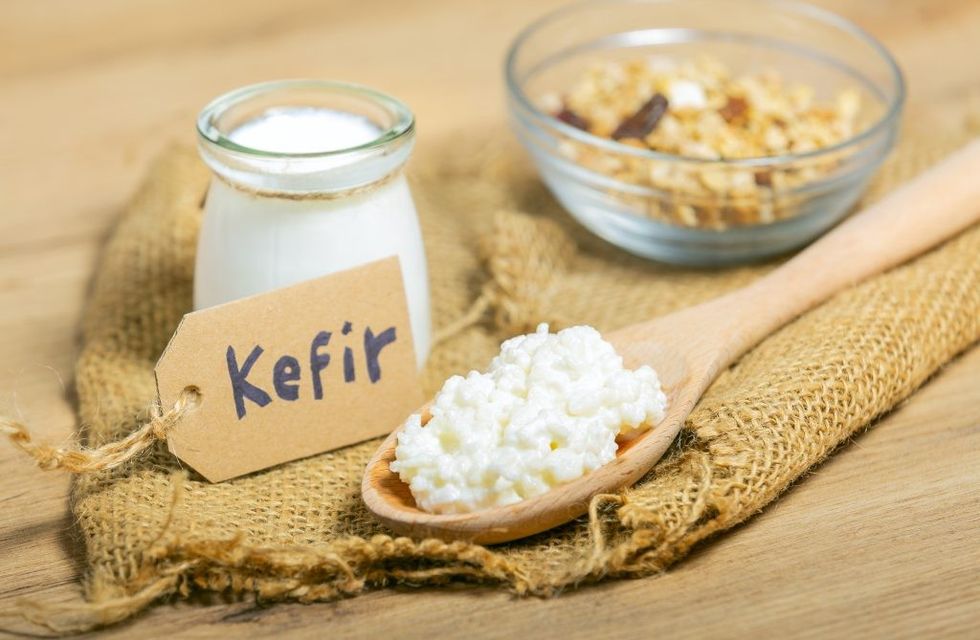
“The heightened awareness of the importance of good gut health has driven the way consumers choose to snack, and influences the types of products they buy. So much more is known now about the impacts of poor gut health, the benefits of looking after your gut microbiome, and the role that Kefir can play in improving gut health, so we have seen this extend to snacking,” Tucker says.
“Consumers now want to be able to snack on something that is convenient, nutritious AND tastes good too. At the same time, consumers are unwilling to compromise on other product attributes - they want snacks to deliver added health benefits too,” she adds.
Biotiful Kefir products are a great source of fibre, and either low in sugar, or with no added sugar. Tucker highlights their 500ml Original & Cherry as great for the take home customers and 250ml Original & Cherry for the on-the-go customers in convenience stores.
She also advises retailers to position healthy snacking next to coffee machines to drive incremental purchases.
“Consumers don’t want a quick sugary fix, but instead want an offering that provides genuine nutritional benefits, while still being convenient and tasting delicious,” she notes.
“The performance of Kefir within convenience across 2023 has demonstrated this. As we have mentioned, consumer awareness of gut health is HIGH, and this is reflected in the purchasing decisions being made in convenience. Retailers will need to keep up with this by ensuring products such as Biotiful Gut Health are readily available.”
The brand has embarked on a significant programme of consumer advertising to raise awareness of the product, which includes outdoor advertising and online advertising.






